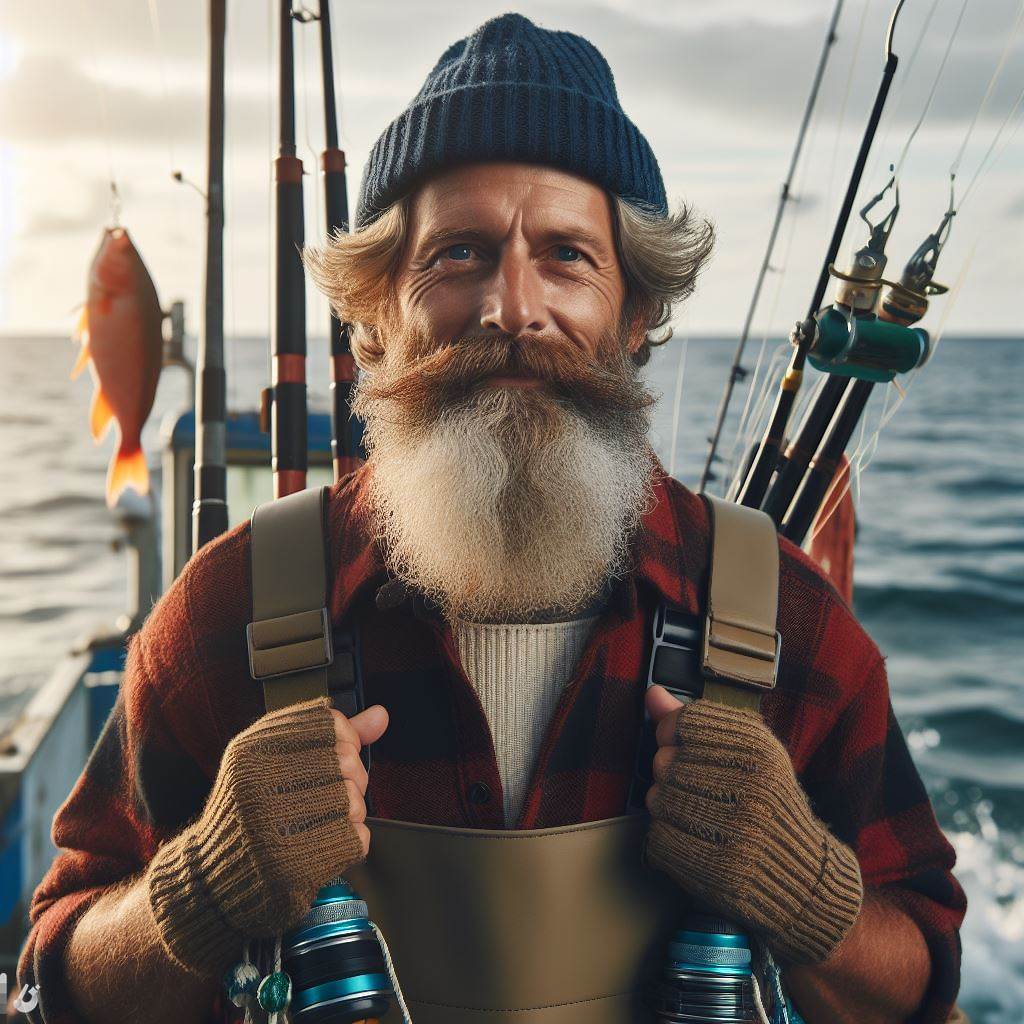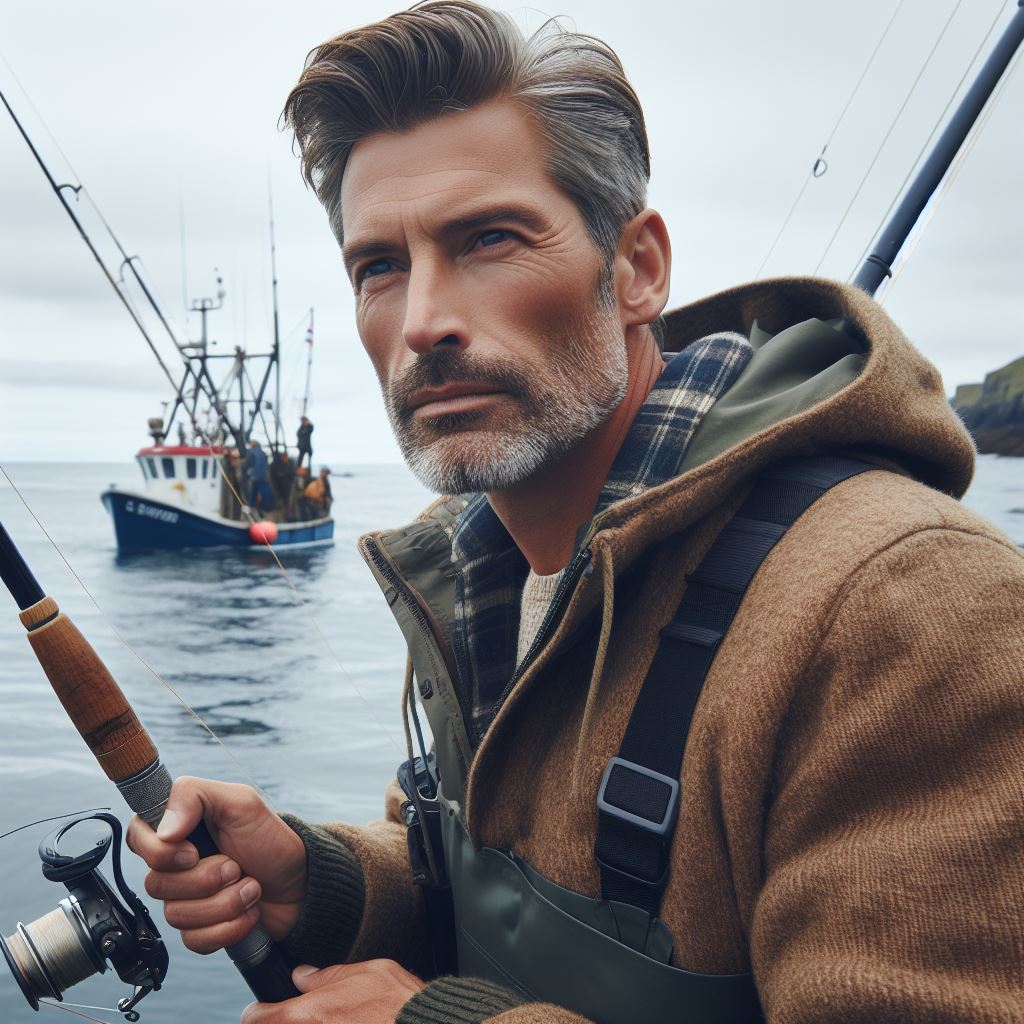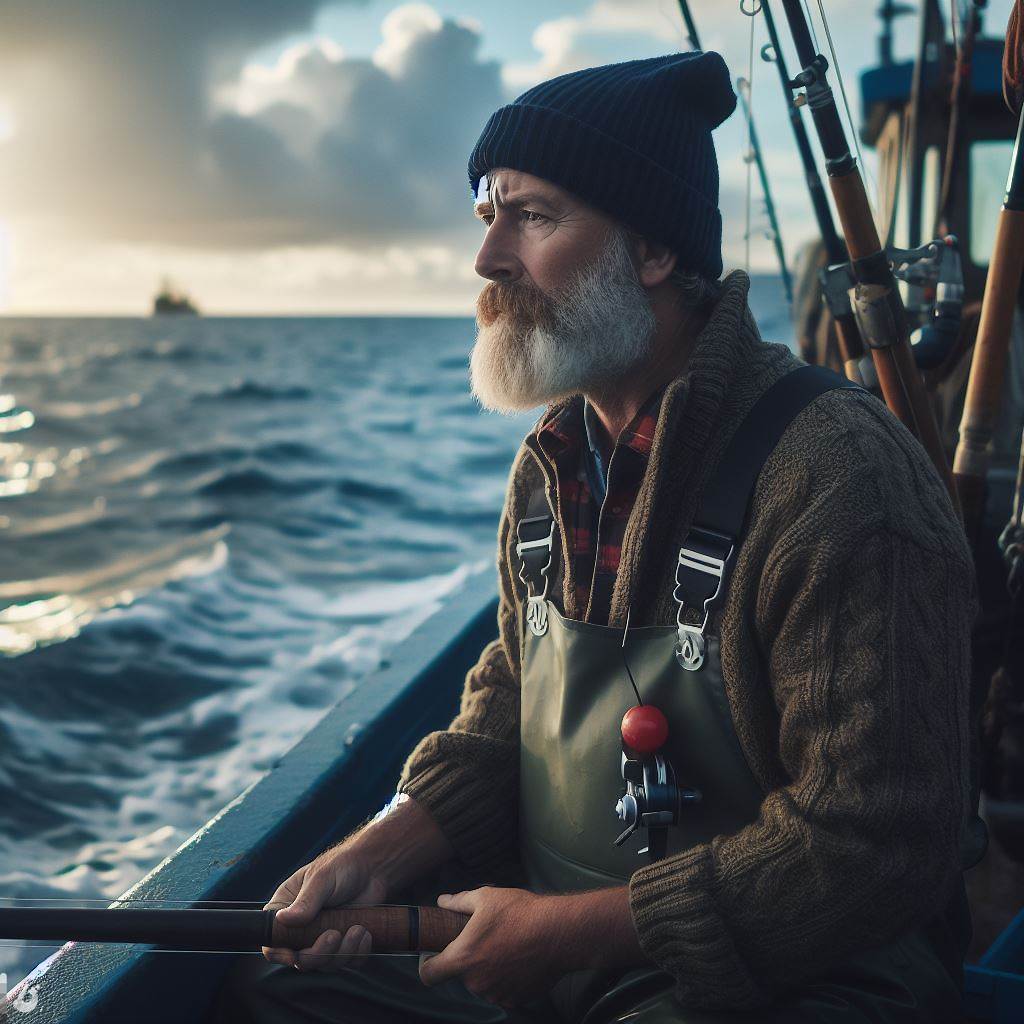Introduction
Deep-sea fishing in the UK is an important industry that supports coastal communities and provides livelihoods for many individuals.
Interviewing UK fishermen allows us to hear firsthand about their experiences, challenges, and perspectives.
Through these interviews, we can gain a deeper understanding of the unique and often dangerous profession of deep-sea fishing.
The purpose of this blog post is to shed light on the lives of UK fishermen, giving a voice to those who work tirelessly to provide us with the seafood we enjoy.
By hearing their stories, we can appreciate the immense challenges they face, such as long hours, unpredictable weather conditions, and physical demands.
Moreover, through interviews, we can also understand the impact of regulations and conservation efforts on the industry.
This blog post will explore the thoughts and opinions of UK fishermen on issues such as sustainable fishing practices and the balance between economic viability and environmental preservation.
By delving into these deep-sea tales, we hope to bring attention to the contributions and struggles of UK fishermen, fostering a greater appreciation for the seafood we consume.
Join us on this journey as we navigate the vast ocean and discover the stories that shape the lives of these brave and dedicated individuals.
Background on UK Fishermen
Description of the Profession
Skillset required
Deep-sea fishermen in the UK are a formidable breed, mastering a diverse skillset crucial for navigating the unpredictable waters and reaping bountiful harvests.
Their expertise extends beyond merely dropping nets into the abyss; it involves an intricate dance with the sea, encompassing precise navigation, intricate netting techniques, and acute species identification.
The profession demands a constant honing of these skills to adapt to the dynamic nature of the deep-sea environment.
Challenges faced
Enduring unpredictable weather, dwindling fish stocks, and evolving regulations, these skilled professionals showcase remarkable resilience in their work.
The ability to navigate through adversity and adapt to the changing tides is intrinsic to their success.
Historical Significance of Deep-Sea Fishing in the UK
UK fishermen, shaping the nation’s identity, braved tumultuous seas for centuries, upholding traditions integral to the country’s cultural fabric.
Personalized UK Career Consulting
Receive tailored career guidance designed just for you. Get actionable steps and expert support to boost your career in 1-3 days. Take control of your career now.
Get StartedThe deep-sea tales of courage, perseverance, and the camaraderie forged amid the waves echo through generations, establishing a unique connection between the maritime heritage and the present.
Importance of Preserving the Fishing Industry:
Economic Backbone
Beyond the shores, the fishing industry is a linchpin supporting coastal communities, providing not just livelihoods but also fostering economic stability.
The deep-sea fishermen’s toil sustains a web of interconnected businesses, from processing facilities to local markets, creating a ripple effect of economic prosperity.
Environmental Stewardship
Preserving the delicate balance of marine ecosystems is paramount. As guardians of the sea, fishermen play a crucial role in ensuring the sustainability of fish stocks.
By adhering to responsible fishing practices, they mitigate the impact on the environment, fostering biodiversity and safeguarding the delicate equilibrium of the oceanic ecosystems they depend on.
Cultural Heritage
The deep-sea tales spun by these fishermen are not just stories; they are living threads that connect communities to their maritime roots.
Through these narratives, traditions are passed down, and a sense of identity is preserved.
The cultural richness embedded in the deep-sea fishing heritage becomes a beacon guiding future generations, inspiring them to carry the torch forward.
In the active voices of UK fishermen, one witnesses not just a profession but a way of life.
They embody resilience in the face of challenges, navigate the seas with precision, and safeguard traditions that have weathered the test of time.
They hold the responsibility to sustain and thrive in deep-sea fishing, weaving economic vitality, environmental consciousness, and cultural heritage.
Methodology of the Interviews
Selection Process for UK Fishermen to be Interviewed
The selection process for the UK fishermen interviews was carefully planned and executed.
First, a list of potential interviewees was created based on their experience and expertise in deep-sea fishing.
Specific criteria such as years of experience, type of fishing vessel, and geographical location were taken into consideration.
Your Dream Job Starts with a Perfect CV
Get a tailored CV and cover letter that captures your unique strengths and stands out in your industry. Let us help you make an unforgettable first impression.
Get StartedOnce the list was finalized, a formal invitation was sent to the selected fishermen, explaining the purpose and importance of the interviews.
Those who expressed interest in participating were then scheduled for an interview session.
This selection process ensured that the interviewed fishermen had extensive knowledge and insights into the deep-sea fishing industry.
Description of the Interview Setting and Format
The interviews took place in a comfortable and private setting, chosen to promote open and candid conversations.
A dedicated room was set up with audio and video recording equipment to capture the interviews accurately.
The room was furnished with chairs and a table to provide a relaxed and professional atmosphere.
The format of the interviews followed a semi-structured approach, allowing for flexibility and spontaneity in the discussions.
The interviewer started with a brief introduction, explaining the purpose of the study and ensuring the confidentiality of the participants.
Throughout the interview, the interviewer actively listened, asked follow-up questions, and encouraged the fishermen to share their experiences freely.
The interviews were conducted one-on-one, ensuring that each fisherman had ample time to express their opinions and stories.
Overview of the Questions Asked During the Interviews
The questions asked during the interviews were carefully designed to gather a comprehensive understanding of the fishermen’s experiences.
They included open-ended questions that allowed the fishermen to share their most memorable deep-sea tales, challenges, and successes.
Examples of questions asked include:
- “Can you describe one particularly memorable deep-sea fishing expedition you’ve had?”
- “What are the major challenges you face as a deep-sea fisherman in the UK?”
- “How have technological advancements affected your fishing practices over the years?”
- “What measures do you think should be taken to ensure the long-term sustainability of deep-sea fishing?”
These questions enabled the fishermen to reflect on their experiences and provide valuable insights into the deep-sea fishing industry.
Optimize Your LinkedIn for Success
Boost your LinkedIn profile with a professional bio, keyword-rich headline, and strategic recommendations that attract recruiters. Stand out from the crowd and get noticed.
Optimize NowRead: Forestry Careers: Paths and Progressions
John Smith
Introduction of John Smith and his background as a UK fisherman
John Smith, a seasoned UK fisherman with over 20 years of experience, has dedicated his life to the deep-sea fishing industry.
Growing up in a small fishing village, John learned the trade from his father and grandfather, making it a family tradition.
Summary of key insights and experiences shared during the interview
During the interview, John shared valuable insights and experiences that shed light on the challenges and rewards of being a UK fisherman.
He emphasized the importance of sustainable fishing practices to preserve marine ecosystems for future generations. John also highlighted the immense physical and mental strength required to endure long hours at sea.
Quotes or anecdotes from John Smith that provide a glimpse into the life of a UK fisherman
John faces the unpredictable sea daily, finding solace in its connection during sunrise while hauling in his catch.
Fishing, ingrained in his blood, is a life’s calling, beyond just a job, shaping his identity.
The sea, both friend and foe, imparts humility and respect, teaching valuable lessons about its power.
Responsibility drives John; sustainable, protective practices are crucial for the industry’s future and marine ecosystems.
Anecdotes from John provide insight into the UK fisherman’s life—its challenges, joys, and dedication.
Dedication and passion echo in his words, emphasizing the connection with the ocean and its unpredictability.
Being a UK fisherman is about preserving a way of life, recognizing the vulnerability of marine ecosystems.
John emphasizes responsible fishing, understanding that his livelihood hinges on oceans’ health, committing to sustainability.
Fulfillment amid hardships defines a UK fisherman’s life; John’s love for the job shines in breathtaking moments at sea.
Witnessing sunrises and catching hauls fill him with appreciation for nature’s wonders, adding depth to his connection.
Throughout, John speaks with reverence, acknowledging the ocean’s power, understanding the need for balance, and accepting challenges with humility.
In general, John Smith’s interview vividly portrays a UK fisherman’s life, blending resilience, passion, and an unbreakable bond with the sea.
Read: A Day in the Life of a UK Forester

Sarah Johnson
Introduction of Sarah Johnson and her background as a UK fisherman
Sarah Johnson, a seasoned UK fisherman with over 20 years of experience, shared her captivating journey in the deep-sea world.
Summary of key insights and experiences shared during the interview
During the interview, Sarah highlighted the dangerous nature of the profession, the camaraderie among fishermen, and the impact of climate change on their livelihoods. She emphasized the importance of sustainable fishing practices for future generations.
Quotes or anecdotes from Sarah Johnson that provide a glimpse into the life of a UK fisherman
- “Every day out at sea is a battle with the unpredictable forces of nature, but that’s what makes us stronger as fishermen.”
- “We rely on each other out there. It’s like a tight-knit community where we support and look out for one another.”
- “Climate change has disrupted fish patterns. We are constantly adapting our strategies to ensure we can still make a living.”
- “Fishing sustainably is not just for us, it’s for the generations that will come after us. We have a responsibility to preserve the oceans.”
Sarah’s anecdotes evoked a vivid picture of the challenges and rewards of being a UK fisherman. Despite the risks, the deep-sea life offered a sense of adventure and fulfillment.
Read: UK Farming Subsidies: Understanding the Basics
David Wilson
Introduction of David Wilson and his background as a UK fisherman
David Wilson, a seasoned UK fisherman, has dedicated his life to the deep-sea fishing industry.
With over 30 years of experience, he has witnessed the changes and challenges faced by fishermen in the UK.
Summary of key insights and experiences shared during the interview
During the interview, David Wilson shed light on the difficulties faced by UK fishermen, including declining fish stocks, stricter regulations, and the impact of climate change.
He emphasized the need for sustainable fishing practices to ensure the industry’s longevity.
Wilson also discussed the sense of camaraderie and community among fishermen. They rely on each other for support and share a deep connection with the sea.
He touched upon the dangers they face daily, such as treacherous weather conditions and unpredictable waves, highlighting the bravery and resilience required in their line of work.
Furthermore, Wilson described the economic challenges that fishermen encounter. Fluctuating fish prices and increasing expenses make it difficult for many to sustain their livelihoods.
He expressed concerns about the future of the industry and the need for government support to protect the interests of fishermen.
Quotes or anecdotes from David Wilson that provide a glimpse into the life of a UK fisherman
- “Being a fisherman isn’t just a job; it’s a way of life. The sea becomes a part of you, and you develop a deep respect for its power and beauty.”
- “We rely on each other out there. It’s a brotherhood. When someone is in trouble, we drop everything and rush to their aid. It’s a bond that can’t be explained.”
- “Climate change has had a significant impact on fishing. We see new species appearing and old ones disappearing. It’s a constant adaptation game.”
- “Every time we head out, we face the unknown. The sea can be unforgiving, but it’s also where we find solace and a sense of purpose.”
- “The future of our industry is uncertain. We need sustainable practices and support from the government to preserve our way of life.”
David Wilson’s insights and experiences provide a rare glimpse into the life of a UK fisherman.
He expresses dedication, resilience, and a passion for the sea, underscoring the need to acknowledge fishermen’s challenges and strive for sustainable solutions, preserving their livelihoods for generations to come.
Read: UK Crop Farming: Trends and Techniques
Common Themes and Observations
- Identification of common challenges and experiences among UK fishermen
- The interviews with UK fishermen revealed several common challenges and experiences faced by them.
- One of the recurring challenges is the unpredictable and harsh nature of the deep-sea environment.
- Many fishermen mentioned the constant battle against rough weather conditions, including strong winds and high waves.
- Another common challenge is the decline in fish stocks, which has made it harder for fishermen to make a living.
- Overfishing and environmental changes were cited as the main reasons for this decline.
- The interviews also emphasized the physical toll that fishing takes on the fishermen’s bodies.
- Long working hours, heavy lifting, and repetitive motions contribute to various health issues, including chronic pain and musculoskeletal injuries.
- Mental health challenges, such as stress and isolation, were also identified as common experiences among fishermen.
Impact of technology and modernization on the fishing industry
- The advent of technology and modernization has brought significant changes to the fishing industry.
- Many fishermen expressed mixed feelings about these changes, as they have both positive and negative impacts.
- The use of advanced navigation systems, fish finders, and satellite communication has made fishing more efficient and safer.
- Improved gear and equipment have also increased productivity and reduced physical strain on the fishermen.
- On the other hand, some fishermen mentioned concerns about the loss of traditional fishing skills and knowledge.
- They highlighted the importance of passing down these skills to future generations and maintaining the cultural heritage of fishing communities.
- Overreliance on technology was also recognized as a potential risk, as equipment failures can leave fishermen vulnerable in the harsh environment.
Perspectives or stories that emerged from the interviews
- Several unique perspectives and stories emerged from the interviews, providing a deeper understanding of the fishing industry.
- One fisherman shared a heartfelt story about the bond between fishermen and their boats.
- He described the boat as a companion and a lifeline in the unpredictable sea, fostering a strong emotional connection.
- Another fisherman spoke passionately about the importance of sustainable fishing practices to preserve the resources for future generations.
- He highlighted the need for stricter regulations and responsible fishing techniques to protect the marine ecosystem.
- Some fishermen also shared their stories of camaraderie and solidarity among fellow fishermen.
- They described how they support each other in times of adversity and work together as a tight-knit community.
- Overall, the interviews revealed the intricate web of challenges, experiences, and unique perspectives within the UK fishing industry.
Conclusion
Recap of the main findings from the interviews
Throughout the interviews with UK fishermen, it became evident that their stories and experiences offer a unique insight into the deep-sea world.
They shared tales of battling treacherous weather, encountering fascinating marine creatures, and the hardships they face in their daily lives.
Importance of sharing the stories and experiences of UK fishermen
It is of utmost importance to share the stories and experiences of UK fishermen to raise awareness about the challenges they face and the invaluable role they play in our society.
By doing so, we can enhance public appreciation for their work and encourage support for the fishing industry.
Encouragement for readers to appreciate and support the fishing industry
In the face of declining fish stocks and increasing regulations, it is crucial for readers to appreciate the efforts and dedication of UK fishermen.
Supporting sustainable fishing practices, purchasing local seafood, and advocating for fair policies can make a significant difference in ensuring the survival of this vital industry.
[E-Book for Sale]
500 Cutting-Edge Tech Startup Ideas for 2024 & 2025: Innovate, Create, Dominate
$19.99 • 500 Tech Startup Ideas • 62 pages
You will get inspired with 500 innovative tech startup ideas for 2024 and 2025, complete with concise descriptions to help you kickstart your entrepreneurial journey in AI, Blockchain, IoT, Fintech, and AR/VR.




